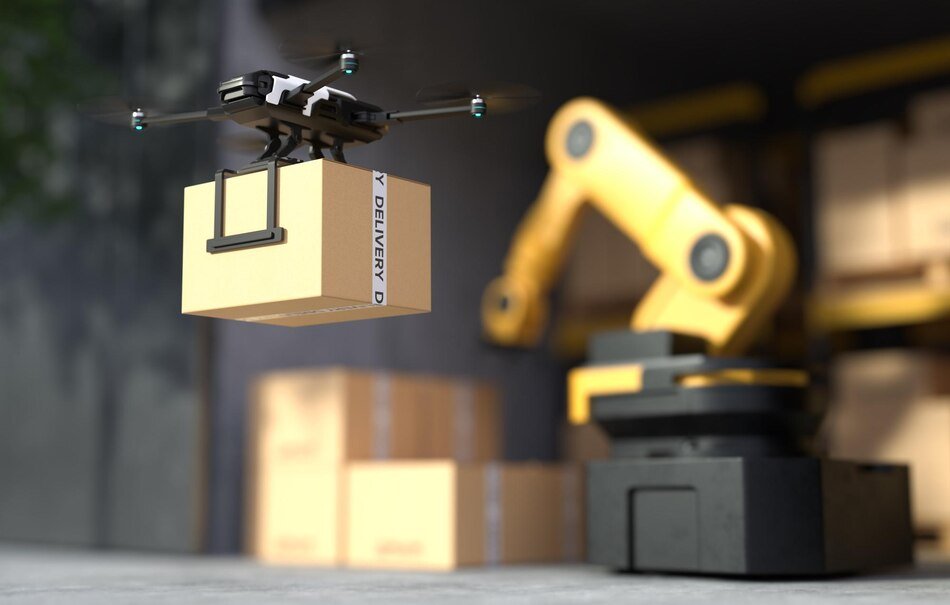The Future Of AI In Logistics Management: Automation Optimization And Innovation
AI in logistics will transform shipping management and delivery. As companies increasingly use technology, AI ‘s importance in simplifying processes, optimizing routes and improving decision making grows. AI automates regular operations and predicts supply chain interruptions changing logistics management. Autonomous cars, smart warehouses and predictive analytics are simply the start of a bigger change. AI offers logistics firms globally more efficient, cost effective and sustainable solutions as it evolves.
Automation And Efficiency Revolution
AI revolutionary influence on logistics is growing as businesses adapt. One of the largest ways AI is changing logistics management is automation. Logistics operations used to rely on human labor which might cause inefficiencies, mistakes and delays. Automation technologies that simplify the supply chain are addressing many of these issues using AI. Autonomous cars, drones and robotic systems are already moving products eliminating human involvement and optimizing delivery times. These technologies enable quicker cheaper dependable and scalable transportation.
Advanced Optimization Strategies
AI capacity to improve operations in new ways is another major logistical innovation. Logistics managers may use AI powered algorithms to plan routes and manage inventories by processing massive volumes of data in real time. These systems examine weather traffic demand and other data to determine the most efficient and cost effective delivery routes. Predictive analytics optimizes truck trajectories to decrease delays and fuel usage for logistics organizations. In inventory management AI is improving forecasting and real time monitoring to keep things in the appropriate spot.
Innovation And New Possibilities
Beyond automation and efficiency AI in logistics might lead to new technologies that change how commodities are moved and distributed. AI is helping create smart warehouses where robots and machines cooperate with humans to sort, store and retrieve things quickly and precisely. With powerful AI and IoT devices these smart warehouses can check inventory levels in real time and autonomously reorder products to avoid delays and shortages. AI is also enabling more sustainable logistics methods including fuel efficient delivery routes and electrified and autonomous cars to lower carbon footprints.
Enhancing Customer Experience And Satisfaction
AI is crucial to the logistics consumer experience. As e-commerce grows, buyers want quicker delivery, more transparency and more personalization. AI powered logistics solutions are addressing these needs with real time tracking forecast delivery windows and automated customer assistance. Predictive analytics is a major way AI improves customer experience. AI systems can predict demand and improve delivery schedules to guarantee consumers get their products on time by monitoring buying trends. Precision improves dependability which boosts client happiness.
AI is also utilized to create 247 customer service chatbots and virtual assistants. These AI powered systems can monitor orders, modify delivery preferences and resolve difficulties in real time without human interaction. This minimizes wait times, enhances consumer trust and streamlines logistics business interactions. AI systems may also provide customizable delivery periods or same day delivery depending on consumer preferences. Personalization creates convenience and loyalty which is crucial in today’s competitive market.
Reducing Environmental Impact And Promoting Sustainability
Sustainability is a priority for enterprises globally including logistics. AI is becoming a valuable tool for logistics sustainability as demand mounts to cut carbon emissions, optimize resource use and embrace greener practices. Optimization is one of AI’s biggest environmental contributions. AI can maximize fuel efficiency and reduce emissions by evaluating weather traffic and historical trends to propose delivery routes. Intelligent routing technologies route cars along the quickest greenest pathways reducing carbon emissions.
AI is also driving logistics’ EV transformation. Logistics organizations are considering electrified and autonomous delivery vehicles due to the environmental effects of diesel trucks. AI optimizes battery consumption maintenance schedules and routes to keep these EVs running well. AI can determine the best charging times and places for electric cars, reducing downtime and increasing range. This combination of AI and electric cars greatly reduces logistics’ environmental effects.
AI reduces waste and promotes sustainable warehousing procedures in addition to transportation. AI powered robots and sensors in smart warehouses check inventory levels to reduce overstocking and packaging waste. AI systems can also identify trends helping firms place more precise orders and reduce unsold items. AI reduces environmental expenses from needless manufacturing storage and delivery by improving supply chain efficiency. AI also identifies inefficiencies across the logistics chain from raw material procurement to delivery prompting organizations to adopt more environmentally friendly methods.
Managing Complex Global Supply Chains

Complex worldwide supply networks are becoming harder to manage as globalization proceeds. AI helps navigate this complexity by giving visibility to real time coordination and proactive management. Demand forecasting is one of the main ways AI improves global supply chain management. AI can accurately forecast demand swings by evaluating historical data, consumer behavior and macroeconomic factors. Businesses may alter their supply chain strategy to ensure the right items are in the right locations at the right time.
AI helps control risk by anticipating interruptions. AI systems can foresee and manage goods flow risks by monitoring external variables like geopolitical events, natural catastrophes and supply chain bottlenecks. AI may recommend alternative shipping routes during port strikes or customs delays to maintain cargo flow. This predictive power is especially useful in global supply chains since regional breakdowns may affect the whole network.
Conclusion
AI is revolutionizing logistics delivering unprecedented automation optimization and innovation. AI improves client experiences sustainability and global supply chain management as it evolves. AI is creating a smarter, more responsive logistics environment by reducing costs, improving efficiency and ensuring reliability. As firms adopt these technologies logistics will become agile, sustainable and customer centric boosting global growth and competitiveness.


